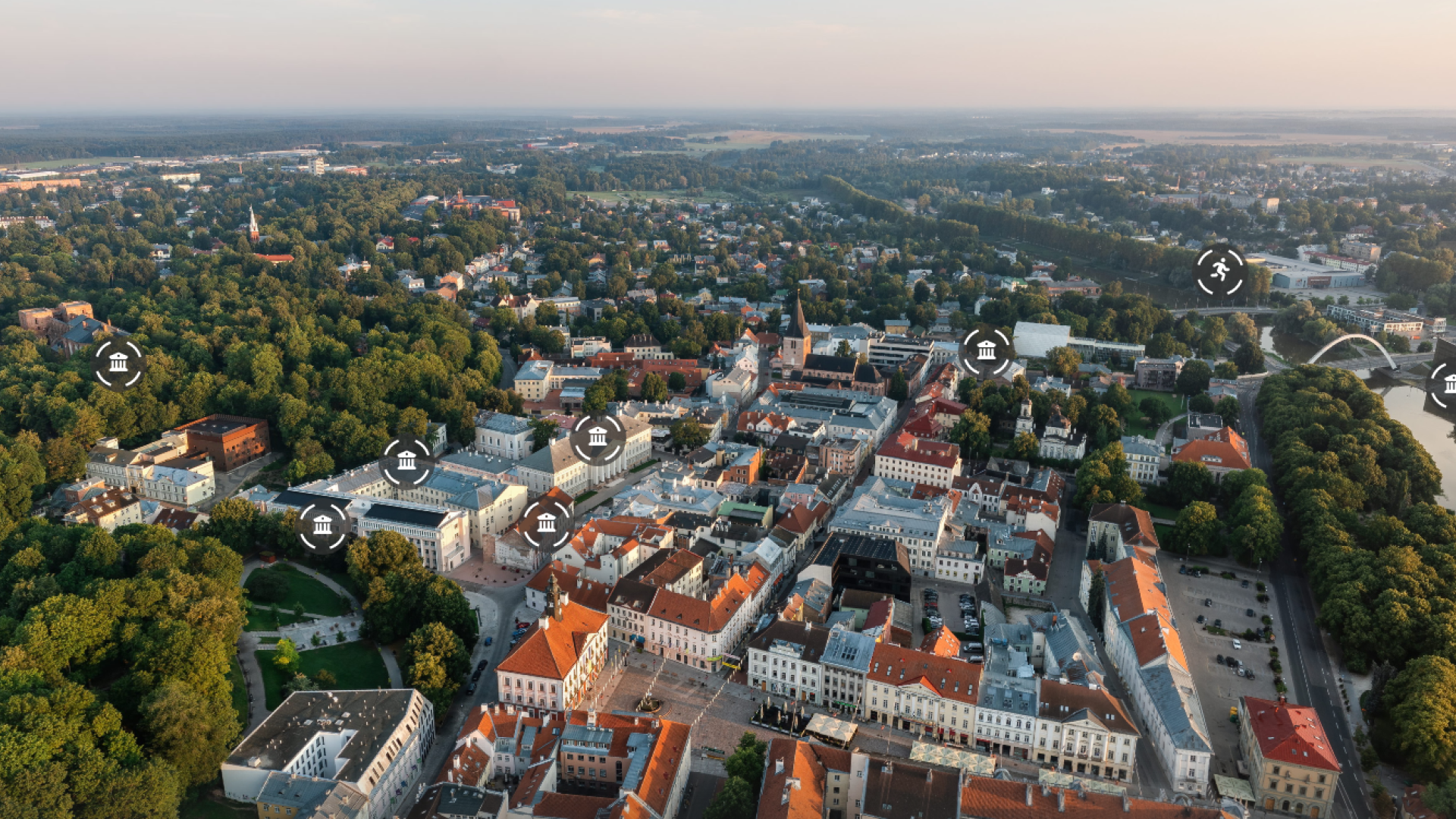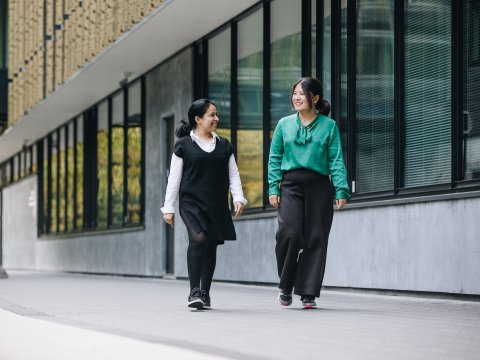Clinical Pharmacy
2 January
15 March
30 April
2 September
- The online programme's flexibility provides an opportunity for professional development to pharmacists who work at either a hospital or community pharmacy, regardless of their location.
- The programme emphasises fostering students' skills in teamwork and helping them develop a network of colleagues to rely on in their professional life.
- A problem-based approach characterises the programme.
- There are no similar programmes in the region.
- The University of Tartu belongs to the top 300 universities in the world in medicine (QS World University Rankings by Subject) and clinical and health (THE Global Subject Rankings 2024) and the top 350 in pharmacy and pharmacology (QS World University Rankings by Subject) (see Rankings and Surveys).
The master's programme in Clinical Pharmacy is an innovative online-based programme designed to cater to the needs of working professionals, offering a unique opportunity for pharmacists, regardless of their location, to advance their expertise in clinical pharmacy. This programme stands out in the region as the pioneer in its domain, with no similar offerings available.
The Clinical Pharmacy master's programme strongly emphasises fostering essential teamwork skills, allowing students to collaborate with peers and build a robust network of colleagues. Through collaborative efforts, students can enhance their abilities to address complex clinical challenges and develop a supportive professional community that will prove invaluable in their future endeavours.
A distinctive feature of our curriculum is its problem-based approach, ensuring that students are equipped with the critical thinking and practical skills necessary for success in the dynamic field of clinical pharmacy. The programme integrates substantial practical training, allowing students to apply theoretical knowledge to real-world scenarios, thus bridging the gap between academia and professional practice.
Recognising the demands of a diverse and geographically dispersed student body, the Clinical Pharmacy programme is strategically designed to be entirely online, providing the flexibility for individuals to pursue their studies while continuing to work in their current positions. This adaptability is particularly advantageous for those who seek to elevate their careers without geographical constraints, creating a pathway for professional development that accommodates the varied needs of our students.
Why study Clinical Pharmacy?
The master's programme in Clinical Pharmacy aims to help pharmacists acquire and demonstrate the competencies in clinical pharmacy through a rigorous programme of study that provides students with the knowledge and skills required to:
- Review and incorporate current evidence into practice
- Work effectively in a multidisciplinary clinical environment
- Make decisions in clinical situations
- Communicate effectively with patients who have common long-term medical conditions
- Undertake clinical and practice-based research

Learning outcomes
Upon completing the programme, you will have a comprehensive understanding of the critical stages of pharmacotherapy. This includes the ability to effectively define problems, formulate treatment goals, select and evaluate the suitability of treatments, prescribe appropriate therapy, inform patients, and monitor or discontinue treatment as necessary.
You will also acquire in-depth knowledge of drug and dose selection principles tailored to individual patient profiles. This encompasses considerations for organ failure, body weight, comorbidities, genetic factors, and other relevant clinical conditions.
Your skills in recognising, assessing, and managing the risks associated with polytherapy, such as drug interactions and side effects, will be significantly enhanced. Additionally, you will develop a keen awareness of determining and monitoring drug concentrations to optimise treatment control.
Finally, the programme equips you with the ability to access and interpret reliable information to address various questions and challenges in pharmacotherapy, further enhancing your expertise and proficiency in the field.
Follow us on social media
You can follow the programme on Facebook.
Programme highlights in video
- Watch the programme director talk about the master's programme in Clinical Pharmacy during Virtual Open Day 2024.
- Watch the presentation about International master's admissions by the Head of International Admissions during Virtual Open Day 2024.
The Clinical Pharmacy master's programme is structured as a session-based training rather than a full-time course. Although the nominal study duration is 1.5 years, amounting to 90 ECTS (European Credit Transfer and Accumulation System) credits, this is distributed across two academic years. In contrast, standard full-time 2-year programmes typically comprise 120 ECTS, with each semester contributing 30 ECTS. This unique structure allows for a more flexible approach to completing the programme.
The master's programme in Clinical Pharmacy comprises the following modules:
1. Fundamentals of Clinical Pharmacy Practice (15 ECTS) - all subjects of the module are obligatory:
- Clinical Pharmacy in Practice – Introduction (5 ECTS)
- Concepts in Research in Clinical Pharmacy (5 ECTS)
- Introduction to Statistical Analysis (5 ECTS)
2. Applied Therapeutics (35 ECTS) - all subjects of the module are obligatory:
- Care of the Elderly and Paediatric Medicines Use (5 ECTS)
- Treatment of Pain and Infections (5 ECTS)
- Chronic Diseases 1 (neurological, cardiovascular, endocrinological diseases) (10 ECTS)
- Chronic Diseases 2 (gastrointestinal, respiratory, rheumatological and psychiatric diseases) (15 ECTS)
3. Elective module (10 ECTS) - Students must choose subjects from this module in the amount of 10 ECTS. One of the elective subjects is a clinical pharmacy internship that lasts two weeks and takes place in the pharmacy of the Tartu University Hospital.
4. Master's Thesis (30 ECTS)
The modules are divided into study weeks aligned with the standard academic semesters. A study week begins on a Thursday and concludes the following Wednesday with a live webinar from 16:00 to 17:30 (GMT+3). Throughout the week, students engage in various activities independently or in groups. These activities include online lectures, home assignments, and self-assessments. The webinar at the end of each week summarises and reviews the material covered in the previous week.
Upon graduating from the Clinical Pharmacy master's programme, you will be awarded a Master of Science degree.
University of Tartu Institute of Pharmacy
The Institute of Pharmacy at the University of Tartu is the only institution in Estonia providing higher education and training for pharmacists. The institute belongs to the Faculty of Medicine (read more about the faculty here).
The mission of the Institute of Pharmacy is to advance the pharmaceutical sciences by conducting high-standard research work and research-based education of MSc(Pharm) and PhD(Pharm) students.
People
Lecturers teaching the master's programme in Clinical Pharmacy come from Estonia and other European countries, including Latvia, Germany, Iceland, Croatia, the Netherlands, and Malta.
Jana Lass, the Programme Director, is an Associate Professor of Clinical Pharmacy at the University of Tartu and serves as a clinical pharmacist at Tartu University Hospital, Estonia's largest healthcare provider (read more about the hospital here).
Get to know the Faculty of Medicine

Visit us virtually
While the master's programme in Clinical Pharmacy is entirely online, we encourage you to visit Tartu and the University of Tartu. Meanwhile, you can also visit us through our virtual tour.
The online master's programme in Clinical Pharmacy is designed to provide professional development opportunities to pharmacists who work at either hospital or community pharmacies.
The programme benefits pharmacists who wish to improve their clinical pharmacy and patient consultation skills.
The programme's flexibility and major focus on e-learning make it especially well-suited to those who work – whether outside of Tartu or in another country.
Our alumni are welcome to work as clinical pharmacists in both the hospital and primary care. They can provide patients with a higher level of medical advice.
Admission requirements for the Clinical Pharmacy programme
- Master’s degree or equivalent qualification in Pharmacy – please see our country-specific document requirements.
- English language proficiency – please see our acceptable tests and exempt categories
NB! Citizens of the Russian Federation who, under the legislation of the Republic of Estonia, cannot apply for a long-stay visa or residence permit to study or do not have a valid legal basis to stay in the Republic of Estonia until the end of the curriculum’s standard period of study are not eligible to apply to the University of Tartu in the 2024/2025 academic year.
According to the current legislation, citizens of Belarus can apply for Estonian long-term visa and temporary residence permit for studies and are therefore eligible to apply to the University of Tartu.
Applications are evaluated based on:
- the score of the motivation letter (yields 50% of the final score)
- entrance interview (yields 50% of the final score)
The motivation letter should be no more than 500 words and should include:
• clear evidence of the applicant’s interests in clinical pharmacy;
• prior experience in pharmacy;
• a description of the expected effects of completing the degree programme on the applicant’s future professional practice and career plans;
• an outline of the candidate’s current ideas about a research topic of master's programme*
*Any research topic described in the motivational statement is not binding and may change during the study programme
Evaluation criteria:
• a good fit between the applicant’s goals and the programme (50 points)
• analytical and argumentation skills (30 points)
• fluency and accuracy of written English (20 points)
Grading scheme:
• each member of the panel evaluates each candidate’s motivational statement on the basis of the three criteria.
• each criterion is evaluated with a maximum score of 100 points
• the overall grade is the average of the panel’s scores
• the maximum score for interview is 100 points and the result is positive only if the applicant gains 51 points or more.
Online entrance interviews will take place 01.04. - 12.04.2024.
Only the candidates who receive at least 51 points from the motivation letter, will be invited to the online interview (conducted via Zoom).
The purpose of the entrance interview is to determine the candidate’s:
• motivation to study in the chosen field and ability to self-analyze;
• motivation to learn independently – including online learning and masters’ thesis;
• critical thinking, reasoning and analysis skills;
• understanding of the nature of teamwork and readiness for teamwork;
• self-expression skills and English language skills.
The structure of the entrance interview:
• introduction of the interviewee and members of the interview panel (1-2 min);
• questions from the members of the panel to establish the motivation, abilities and readiness of the candidate for the challenges of the degree course (8-9 min);
Evaluation:
• motivation to study in the chosen field and the ability to self-analyze (30 points);
• motivation to learn independently – including online learning and masters’ thesis (30 points)
• critical thinking, reasoning and analysis skills (10 points)
• understanding of the nature of teamwork and readiness for teamwork (10 points)
• self-expression skills and English language skills (20 points).
For both assignments the maximum score is 100 points and the minimum positive score 51 points. Only candidates who receive at least 51 points from the motivation letter will be invited to the online interview. After the interview, the final admission score is calculated. The application will be considered for admission if a total score of 66 points or higher is achieved.
For further information on assessing candidates´ academic performance and calculating admissions´ score see here.
How to apply
NB! Estonian applicants should apply via National Admission Information Systems (SAIS). Further information in Estonian is available here.
The following information applies to international students and Estonian students who graduated abroad:
Application system opens on 2 January and closes on 15 March. The following electronic documents must be submitted via DreamApply by 15 March:
- online application
- motivation letter
- official certified copy of the master's diploma or its equivalent and Diploma Supplement (transcript) in the original language (must include description of the grading scale).
NB! Applicants graduating in the upcoming spring/summer and having their diploma and final transcript issued later than the application deadline should electronically submit their most recent official transcript by the application deadline. The transcript should be supplemented by an official statement from the issuing institution indicating current enrollment and expected graduation date. Admitted candidates are required to post certified copies of their graduation documents as soon as these have been issued (no later than by the end of July). - official translation of the bachelor’s diploma and Diploma Supplement (transcript) into English, translation certified
- proof of English language proficiency
- copy of the passport page stating the applicant’s personal particulars
- confirmation/receipt of application fee payment (if applicable). All international applicants are required to pay the application fee EUR 100, unless they have completed the previous study level in Estonia. An application will only be processed after the fee has been received by the UT.
Submitted applications can not be edited. It is only possible to upload new documents (e.g. graduation certificates). Applicants will receive feedback and notifications through the DreamApply system to their e-mail. Incomplete applications or those submitted by e-mail will not be considered for admission.
The evaluation of applications will be made based on the electronic copies added to DreamApply. A general ranking list will be formed based on the electronically submitted applications and admission results (including offers) will be announced to all applicants personally via DreamApply by May 15 at the latest. Admitted candidates are expected to accept or decline the offer in DreamApply in 7 days. If the decision is not communicated to UT via DreamApply by the stipulated deadline, UT reserves the right to withdraw the admission offer.
NB! It is not possible to postpone the beginning of studies to the next academic year.
Terms and conditions of the admission offer
Admission offers are conditional. This means that there are conditions in the offer which the applicant needs to fulfil in order to be admitted (e.g. sending application documents by post; obtaining the required level of education). If the conditions are not met, UT has the right to withdraw the offer. Also, UT reserves the right to withdraw or amend any offer or revoke the matriculation of a student, if it becomes evident that the application contains fraudulent information, the qualification does not provide access to the chosen study programme or the student is found to have omitted key information from the application. Should such circumstances occur, UT will not be liable for any material or immaterial loss which the student may suffer as a result.
Once the admission results have been announced, all admitted students are required to send the application documents by post to: Student Admissions, University of Tartu, Ülikooli 18-132, Tartu 50090, ESTONIA.
The documents are expected to be mailed only by those receiving the admission offer (unless instructed otherwise by the admissions staff). The documents must reach the university within 3 weeks from the announcement of the offer. If the application documents do not reach the us by the deadline, the university has the right to withdraw the admission offer. Applicants will be informed when their documents have arrived.
Requirements for educational documents
All copies of educational documents (diplomas and Diploma Supplements/transcripts) must be officially certified. By certified we mean that the copies should bear an original signature and seal of the authority certifying that these are true copies of the original document(s). The copies can be certified either 1) by an authorised official of the issuing institution, or 2) by a notary, or 3) with an Apostille attached. NB! Country-specific requirements may also specify the way documents from certain countries must be certified.
Please note that UT does not accept simple copies made on the basis of already certified copies (primary copies are needed).
All admitted students are required to present their original qualification certificates upon arrival (unless these were sent directly from the issuing institution).
Paying the tuition fee (applicable to applicants who receive a fee-based study place offer)
• EU/EEA/Swiss citizens are required to pay the fee for the first semester once they arrive in Tartu (by 20 September at the latest after signing the fee contract, please read more here).
• Admitted students from other countries are required to pre-pay half of the first semester's tuition fee. The invoice along with the pre-payment deadline and payment details will be sent to applicants via DreamApply after they have accepted the admissions offer and the University has received the hard copies of the application documents. Second part of the fee is due on 20 September. NB! The official admission letter (necessary for visa application) will only be issued once the University of Tartu has received the pre-payment.
NB! Once you have been offered a fee-based study place, be aware that it will not be changed into a fee waiver study place. By transferring the pre-payment to the university, you confirm that you have informed yourself about the process of the visa and temporary residence permit application and you are able to arrive in Estonia by the start of the academic year. If you have any questions please contact studentvisasupport@ut.ee.
The official admission letter will be sent to admitted students electronically via DreamApply only after the admissions office has received and reviewed hard copies of the application documents, and received the tuition fee pre-payment (if a pre-payment was required, please see step 3 for more details).
NB! The electronic admission letter is also sufficient for non-EU students for applying for visa/residence permit in Estonian embassies.
Once the admission letter is issued, accepted students may proceed further with arranging their arrival. All non-EU students should first consult information on the process of visa and temporary residence permit application to be sure, as where and when the relevant documents need to be applied. Note that housing at the UT dormitories can be applied during a limited period of time, unless specified otherwise on the website. For housing alternatives please find further information on Tartu Welcome Centre website.
NB! Admitted students who are not citizens of an EU or EEA country or Switzerland need to make sure they obtain the Estonian long-term visa on time in order to be able to participate in the orientation programme for international students held in the last week of August. They are also required to visit the Admissions Office in person to complete their arrival registration by September 2, 2024, at the latest. Failure to do so will result in the revocation of their admission decision and visa.
Travel information can be found here.
Based upon common queries, the most important information has been summarised into a pre-arrival information website UT Getting Started.
Estonian applicants should apply via National Admission Information Systems (SAIS). Further information in Estonian is available here.




